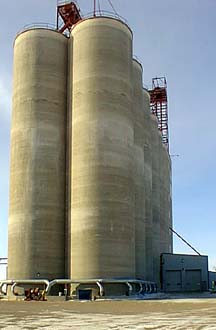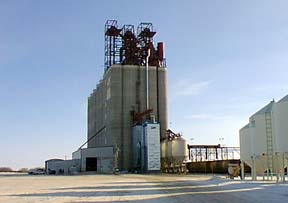
 heat and hogs is likely to remain
in effect for as long as three or more years. He was able to back up his predictions
with reasonable consideration of various world conditions which included Brazil's
economy on the skids, Argentina expecting a good crop, Russia unable to afford imports
and China actually now exporting, instead of importing food products.
heat and hogs is likely to remain
in effect for as long as three or more years. He was able to back up his predictions
with reasonable consideration of various world conditions which included Brazil's
economy on the skids, Argentina expecting a good crop, Russia unable to afford imports
and China actually now exporting, instead of importing food products.The economist went on to add some obvious conclusions, that if his predictions were close to accurate and no significant government intervention took place, then a large number of people currently farming would have no alternative but to leave their dreams and debts behind them. He said that it was his assessment that agriculture is simply over producing and unless there was serious problems in some agricultural areas of the world, then the only solution is to reduce the output by committing more land to summer fallow and providing government support.
As we who live in this land and appreciate the ability of the great central plains to provide abundant production, while knowing full well that in much of the third world, food production is less then required to provide adequate diets for the planet's inhabitants, it really makes a person rub their eyes and scratch their head.
Harvest Valley and its other grain handling neighbours are the promise of the future, intended to move truly massive amounts of production to market efficiently. Since the thirties we have witnessed the steady expansion in farm size and equally remarkable capability of efficient cost effective land and crop management. As a non-farmer I look at those who do and believe that we have the best qualified and most highly training agricultural producers in the history of the planet tiling the land today. Some how, we should be, as a society, rewarding this achievement and not punishing the farming population for their success.

There will be people who read this and remember well the days of Otto Lang, the Saskatoon native who as minister of agriculture set to work trying to cope with low grain prices and high productivity. His government's solution was a programme to pay farmers not to plant their fields and I recall acres of table tops in Regina office buildings with people going over aerial photographs of Saskatchewan wheat land trying to determine production levels. Mr. Lang's programme was attempting to achieve the same results as the US Department of Agriculture of the time when it was buying grain from farmers and paying them storage. Surely, we have learned something from these exercises, but then again maybe not.
It would be presumptuous for me to suggest a solution to this problem but at the same time it would equally irresponsible to not offer a suggestion or two. The main problem farmers seem to be experiencing is that the products they produce, though available in abundance, do not return sufficient profit to cover the cost of that production. It would seem that since we have little or no control over the prices which seem to be determined by world financial and economic conditions, then that leaves us with alternatives that we can implement here at the supply end. The two obvious solutions of the past and now being brought up again, are to grow something that will be of a higher value, or not grow at all and be subsidised for not growing.
Of these two alternatives there is little likelihood of government subsidies to reduce the level of
 production. Both Ottawa and Washington tend to go with the political clout
and the low percentage of the population who are farmers, make attending to their
needs politically unnecessary Diversification has merit, as we have seen Canola in
this past twenty years spread from here, all across the prairies. Peas and lentils,
elk and buffalo all have produced income for farmers who have ventured into these
new product lines, but when it comes down to it, some parts of Saskatchewan are pretty
well destine to produce crops that are of low value because of climate and soil conditions.
It is time to look for more alternatives.
production. Both Ottawa and Washington tend to go with the political clout
and the low percentage of the population who are farmers, make attending to their
needs politically unnecessary Diversification has merit, as we have seen Canola in
this past twenty years spread from here, all across the prairies. Peas and lentils,
elk and buffalo all have produced income for farmers who have ventured into these
new product lines, but when it comes down to it, some parts of Saskatchewan are pretty
well destine to produce crops that are of low value because of climate and soil conditions.
It is time to look for more alternatives.Those parts of North American that are dependent on agriculture have made serious efforts to diversify their economy so that the ups and downs of agriculture are moderated and in many parts of the continent these ventures have proven themselves as can be seen with the many industries in the area around Humboldt. But we need to understand that creating industries to provide part time or alternative income to farmers, is not addressing the real problem and that is, that this is agricultural land and populated by agricultural people and there is a sort of common sense feeling, that this is the way things should be. There is nothing magic here, there are no quick solutions, but there are some basic success stories and we need to give them some serious thought.
I am in the computer business and this industry relies upon devoting substantial amounts of income to research, I am not just talking about the big companies but the smallest ones as well, have to spend considerable time keeping abreast of developments and often breaking new ground. Ensign itself it a project attempting to see if content in itself is a valued and marketable commodity. About one in five days of work needs to
 be
spent on research to keep up. How much are we as a society, spending on agricultural
research?
be
spent on research to keep up. How much are we as a society, spending on agricultural
research?The evidence is that we have seen government run agricultural research facilities drastically cut back, to the point that their work is a mere shadow of what it once was, while big corporations aware of the shifting market place and the impending further depopulation of the agricultural community, is spending big money in making products that will turn a buck for them. Not for the farmer, but for the corporations, their research is directed toward enhancing their profits. Individual farmers can not be expected to set up labs and genetic engineering facilities of their own, but unless positive productive technological research and development is done on behalf of farmers, they will become extinct.
Minnadosa has a working methyl alcohol production plant and Nipawin has an extremely successful and profitable crushing plant, but those are the only two large scale alternative agriculturally based projects I know of and that is our problem. We need badly to find alternatives that will work for our environment and suited to the production capabilities of the surrounding areas.